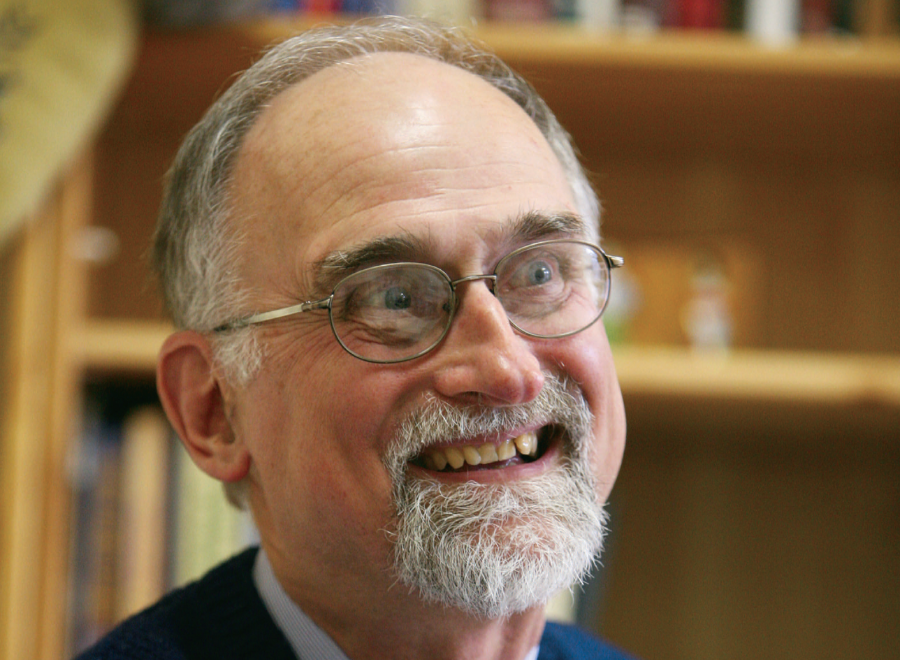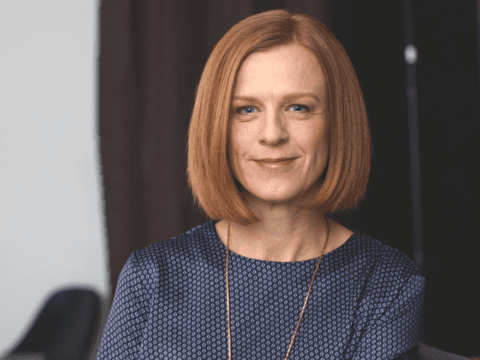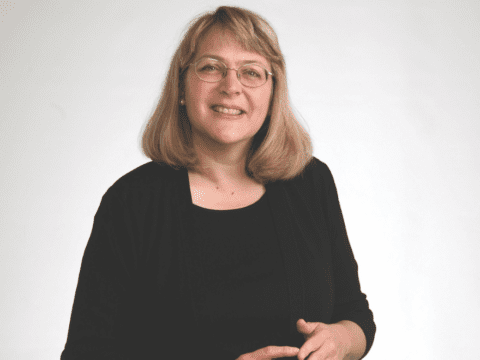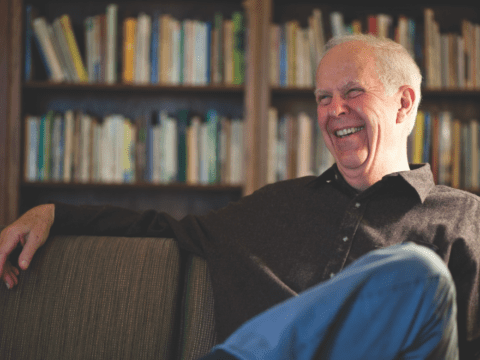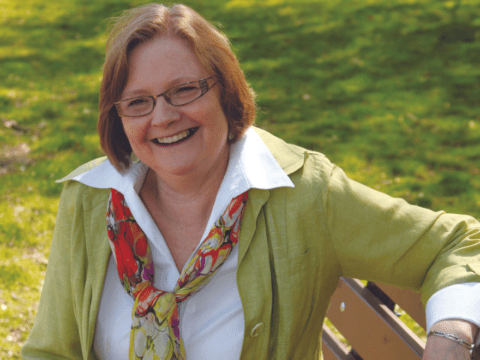Toronto minister Rev. Ambury Stuart has a doctorate in atmospheric physics and has been a respected climate change scientist for two decades. He talks to Lee Simpson about the convergence of faith and science.
LEE SIMPSON: How would you describe your call to ministry?
You may unsubscribe from any of our newsletters at any time.
AMBURY STUART: Sunday school teacher Ed Edmonds at Central United inMoncton, N.B., taught me it was okay to question Scripture. Later, I struggled to bring my faith into coherence with my science. In 1998, I read The Faith of a Physicist by Rev. Dr. John Polkinghorne, which was a scientific analysis of the Nicene Creed. But I couldn’t understand it because I didn’t know enough theology: What’s “eschatology”? Who are the “Church Fathers”? I registered at Emmanuel College, with the idea to do Theology 101 and get out. But the rules said I had to take Old Testament Bible studies first.
My professor was the amazing Gerry Sheppard, and he opened Scripture to me in remarkable ways that pushed me toward ministry.
LS: What was the moment of decision?
AS: After a challenging internship at Vancouver’s eastside mission [an outreach of First United], I was six credits short of a master’s of divinity but had no real pastoral charge experience. I was glancing at The Observer and saw an ad for a minister at Glebe Road United in Ottawa. I thought perhaps in the interim that the church might require a student supply. It was an instant love affair. I returned to Emmanuel and ended up serving this congregation.
LS: What was the reaction of the courts of the church to a man of science who wanted to be ordained?
AS: I started taking the courses and that was fine. When I entered the discernment process, though my congregation was supportive, the Presbytery representative expressed doubts that a scientist could be a Christian. We had some difficult discussions about Scripture and about what scientists do and don’t do and what I might be doing to “manipulate the faith.” I was rubbing up against the more conservative wing of our church. It was good learning.
LS: As a man of science, were you challenged by what you were asked to pledge at the time of ordination?
AS: No more than any other minister who has wrestled with the implications of being in “essential agreement” with a church doctrine written in 1908. If you are a scientist who doesn’t have a faith, then you don’t think about issues such as the inerrancy of Scripture. If, however, you’ve struggled for 30 years as I had to make sense of the Scriptures then, no, the challenges of ministry education are all part of the process.
LS: What was the reaction to your ministry from scientist colleagues?
AS: They fell into two distinct camps.
There were those who thought I was nuts, wondering how I could give up a career. Some thought I was selling my rational soul. Then I’d tell them about courses I was taking at Emmanuel College, that the Bible is open for analysis and questioning. They hadn’t known that. And then I had friends who were totally onside.
LS: What part does your scientific background play in your preaching?
AS: For example, the Palm Sunday text was Philippians 2:5-11. In it, God humbly became human. God came in the flesh and became a servant and slave. We, too, have to humble ourselves and reach across the species in the way God does. From Divinity to humanity, we need to humble ourselves in our world and look at all species. We must be servants of the Earth to save our planet. And that brings us right into ecological issues and creation debates. Oh yes, there are times when the Scriptures speak to my experience, and I lift those up to make connections for others — that’s an exciting way to process and live my own faith.
LS: Do you have any favourite scriptural passages that evoke your own understanding of science?
AS: Absolutely. The dry bones in Ezekiel 37: “Mortal, can these bones live?” From Ezekiel comes the answer that only God knows how to do that. Praising and prophesying causes them to be lifted up. But there is no life until the breath of God is breathed into the creature. To me, this is God giving life out of the earth and this is something for which we have strong scientific evidence. Once there was an earth with no life and the life came out. For me, for us as believers, that is how it happened.
LS: Are there issues of faith that challenge you specifically because of what you know as a scientist?
AS: Most troubling doctrinally is Original Sin and the scriptural supports of that. The idea is that “First Man” Adam commits a sin that gets passed on, as ancient theologian Augustine thought, in the act of having sex. Well, if you believe in evolution, as I do, then there was no first man. We evolved. So how does that work? Yet, at the same time, sin is something for which there is enormous observational evidence.
LS: Does being trained as a scientist impact you as a pastor?
AS: Scientists tend to be loners. They are stereotyped as having underdeveloped interpersonal skills, living in their labs or in front of computers. I was by myself a great deal in my scientific practice. I had to grow out of that and into being a social animal again. Hard to say whether I have been successful, but I have been strongly affirmed by my congregation.
LS: You know a great deal about the composition of our universe from a scientific perspective. But how do you answer Mary Jones, recently widowed member of your congregation, when she asks you whether she will be reunited with her husband in heaven?
AS: I would remind Mary that we are surrounded by love always. I would tell her that her husband continues to be surrounded now and knows love even better. Death is a breaking; it is a leave-taking. We can’t deny that. But, in a way, the love that compels her to ask the question answers itself. There is so much love available in this world. Isaiah says that heaven will be right here on earth. I am not in a hurry to be transported to some ethereal place; I’d like to stay here and experience Isaiah’s heaven.
LS: What are the greatest challenges at the intersection of science and faith today?
AS: Segments of the Christian community, inspired by Revelation, believe we don’t need to worry about this environment because Jesus is coming back to take us up to heaven and the earth will be destroyed in great balls of fire. That’s an argument that allows people to wash their hands of all ecological responsibilities, to dismiss the extinction of the species. Evolution, for a person of faith, should force us to relate to other species in a positive way. We have arisen from those species. The reality is, as Michael Dowd says in Thank God for Evolution!, we are related not only to the monkeys but to zucchini. Faith in God does not permit an end run around the responsibilities of care for the planet implied in evolution.
LS: Recently, The Observer sponsored the Royal Ontario Museum’s Darwin exhibit. Were you surprised that more sponsors didn’t come forward, presumably because of feared backlash from those who accept only a literal reading of the Bible and reject evolution?
AS: I found it sad. There is some “creationist chill” in this country, including in a few United Church congregations where evolution is perceived to be not for the faithful. However, after the death of American televangelist Jerry Falwell and the fading of some of the more strident forces in the United States, there was a rethinking in the evangelical community. One sign of a stronger commitment to ecological responsibility was a recent article on global warming in the evangelical journal Faith Today by Geoff Strong, a Canadian, an evangelical, a friend, a professor of Earth sciences and an environmentalist. Yes, I am becoming more hopeful by the day: the creationist chill is thawing.
***
This story first appeared in The United Church Observer’s May 2008 issue with the title “‘To save this planet, we have to reach across the species the way God did.’”

